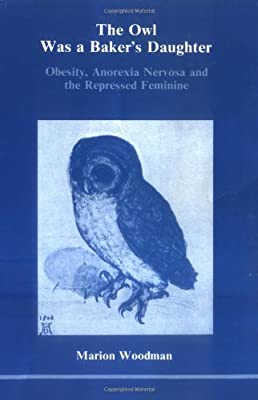The Owl Was a Baker’s Daughter: Obesity, Anorexia and the Repressed Feminine
by Marion Woodman
Introduction
7. Certainly, some women rejoice in their plumplness and experience no difficulties with their size. This book is not concerned with them. It is a study on the agonies of fatness and its psychic and somatic causes.
7. Consciousness will not always solve the problem, but it may make the suffering meaningful.
8. Possessed by her own busyness and fantasies of the great day to come, she misses reality staring her in the face. The bread which she steals from the god swells “to a most enormous size”; the mystery which she rejects at the back door materializes into a monster at the front.
8. In Greece, the owl was Athena’s bird, symbolizing her affinity with darkness.
9. She never finds her own voice. She never finds her own body or her own feelings and therefore misses life and love in the here and now.
9. Every woman haunted by obesity knows the agony of looking into a mirror and seeing an owl staring back at her… The split between her head and her body is destroying her life and she is powerless to break the spell.
9. In essence I am suggesting that 20th-century women have been living for centuries in a male-oriented culture which has kept them unconscious of their own feminine principle. Now in their attempt to find their place in a masculine world, they have unknowingly accepted male values–goal oriented lives, compulsive drivenness, and concrete bread which fails to nourish their feminine mystery. Their unconscious femininity rebels and manifests in some somatic form. In this study, the Great Goddess either materializes in the obese or devours the anorexic. Her victim must come to grips with her femininity by dealing with the symptom. Only by discovering and loving the goddess lost within her own rejected body can a woman hear her own authentic voice.
Chapter 1: Experimental Background
11. Modern research into obesity has proved that putting on weight is more than a simple matter of eating too much. Two individuals may eat exactly the same number of calories and lead an equally active life. One is fat, the other thin. The fay one may, in fact, be eating less and exercising more. The essential difference lies in the individual’s capacity to metabolize the caloric intake. Behind any metabolic disturbance there may be both physiological and psychological causes.
11. Some people seem to be “programmed” to be fat; others grow fat for diverse reasons. Endogenous or primary obesity develops from within; exogenous or secondary obesity requires overeating, i.e., is imposed from without.
12. Hypercellularity (increased number of cells) begins early in life, and may be genetically influenced.
12. Weight reduction in all obese patients, regardless of age of onset or degree and duration of obesity, has ben found to be achieved only through change in cell size. Cell number remains constant even when there is massive weight loss. Individuals obese from childhood may have three times as many fat cells as those of normal weight. This accounts for the fact that lifelong obese persons may lose weight, but almost inevitably regain it. The permanent fat cells are waiting to be refilled the moment will-power fades.
13. Each individual psyche has its own peculiar reality.
14. An active complex puts us momentarily under a spell of compulsive thinking and acting. Jung felt “moderately certain” that complexes were “splinter psyches” which appear in personified form in our dreams when there is no inhibiting consciousness to suppress them.
15. (I chose to work with women only, because after conducting the experiment with three obese men I recognized that their problems were very different, deserving a separate study.)
keyword list:
consciousness, suffering, fatness, somatic, psychic, owl, baker, daughter, mother, father, transformation, swelling, mystery, monster, fantasies, reality, athena, haunted, obesity, mirror, agony, powerless, spell, metabolic, eating, calories, exercise, fat, thin, physiological, psychological, weight, metabolize, feminine, culture, male, great goddess, goddess, unconscious, compulsive, drivenness, symptom, loving, lost goddess, primary obesity, secondary obesity, endogenous, exogenous, genetic, hypercellularity, fat cells, development, psyche, onset, weight loss, childhood, splinter psyches, complexes, compulsive, thinking, jungian,

